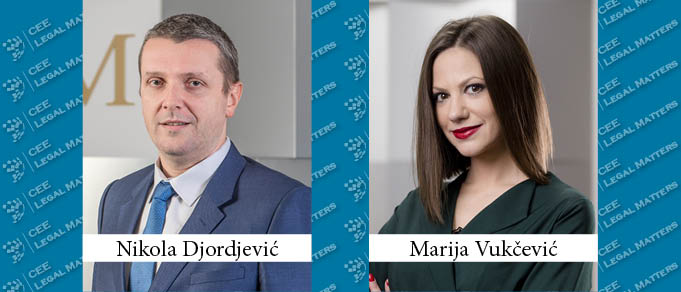JPM partner Nikola Djordjevic and Senior Associate Marija Vukcevic single out and analyze official clarifications and opinions on the application of financial regulations for January 2022, related to taxes, which have been published in the latest newsletter of the Ministry of Finance of the Republic of Serbia.
Tax treatment of natural person revenue accrued on the basis of acquisition of shares in the company in which the natural person is an employed, i.e. in the company that is an affiliated company of the employer
(The opinion of Ministry of finance no. 011-00-863/2021-04 dated 18 November 2021)
The matter of acquisition of stocks, i.e. shares by the persons employed in a company - employers (or their affiliated companies), has been in a spotlight since the application of amendments on the Companies Law, which commenced on 1 April 2020.
Even though the possibility of so called “stock options” for third parties existed in regard to joint stock companies before the mentioned amendments, which is similar to the practice in other countries, these amendments provided for this possibility also in relation to limited liability companies, as the most common form of companies in Serbia.
These amendments introduce the concept of reserved own share of the company and of the financial instrument – the right to acquire share, a financial instrument which may be granted to third parties (so called “share option”) on the basis of the reserved own share of the company.
The effect of this financial instruments is mostly noticeable in the context of, nowadays widely spread, concept for motivation of employees – the companies enable their employees to acquire stakes/shares in the company on a specified day (due date) and for a specified price, aiming to motivate their employees to be even more productive by giving out a share in the ownership structure of the company.
Regardless of the matter of commercial effects of this approach, both the positive ones – effect of better business running of the company due to higher motivation of the employees for their company to accrue more profit so the value of its stocks/shares would rise and, the negative ones – large dispersion in ownership structure, low percentage of participation in share capital that excludes the possibility of an employee to participate in decision making in regard to business operations of the company, as well as, after all, negative effects of such concept familiar to this region from the period of self-managing socialism, the Ministry of Finance tackled this matter from the perspective of tax related effects of this practice.
In this opinion, the Ministry of Finance considers the matter of tax treatment of the revenue accrued by an employee on the basis of acquisition of share in a company – affiliate of the employer, which is regulated under the Personal Income Tax Law (the „Law“). This matter does not differ in its substance from the matter of tax treatment of the revenue accrued on the basis of acquisition of share in the company – employer (the Law equally treats both cases).
Having in mind the provisions of the Law, stating that other income of the employee including, inter alia, securities received by the employee from the employer or affiliated company of the employer, becomes taxable salary of an employee in the moment when such employee becomes entitled to dispose of such securities, as the starting point of analysis, the Ministry of Finance further accounts the exception prescribed by the Law, on the basis of which the salary tax is not due on income received by an employee from the employer on the basis of: (i) (own) stocks; (ii) (own) stock options; or (iii) (own) shares of the employer or its affiliate, which are received by the employee from the employer, without remuneration or for discount price.
In accordance with the above, the Ministry of Finance confirms the stand that for such income of the employee salary tax is not due (meaning only salary tax, not including other potential taxes such as, for example, annual income tax), naturally, provided that the conditions stipulated by the Law are met – besides the conditions which, in substance, condition the application of this exemption by mandatory proper application of the provision of the Company law (the procedure and form for determining the reserved own share and granting, i.e. exercising the right to acquire share), these are the conditions that regard the relation of the employee towards its employer and/or acquired share, which conditions aim to secure certain continuity in such relation. These conditions assume that the employment relationship is not terminated, i.e. that an employee does not sell this share for the period of at least two years, as well as that the employer/its affiliate do not buyback (own) shares from such employee. Even though the Law (and the Rulebook on exercising the right to tax exemption for income of the employee on the basis of own stocks acquired without remuneration or for discounted price) speaks exclusively about stocks in this part, the fact that the Ministry of Finance makes a reference to these conditions in this opinion implies that the Ministry takes the stand that these provisions equally apply to shares in a limited liability company.
We should also mention herein the opinion of the Ministry of finance no. 011-00-588/2020-04 dated 13 November 2020, published in the newsletter for November 2020, which tackles the matter of tax treatment from other (opposite) direction – the tax treatment of free-of-charge transfer of a portion of share by the sole shareholder – natural person to the company in order to create a reserved own share for the purpose of issuance of financial instrument – right to acquire share. This opinion confirms that, since this is a transfer that is free of charge, no capital gain that would be taxed by capital gain tax exists. Naturally, this does not affect the tax treatment of revenue that the company potentially accrues in the later stage by selling such reserved share to a third party granted with the financial instrument – right to acquire share, which revenue falls under the scope of application of Corporate Income Tax Law.
Having the above in mind, the Republic of Serbia seeks to make its own contribution to the concept of motivating employees through so called „share options“ mechanism by means of above provisions of the Law and the interpretation thereof by the Ministry of Finance, by exempting the income accrued on the basis of shares acquired through the financial instrument – the right to acquire share from the personal income tax obligation, but only in relation to the employees, i.e. only in the context of salary tax.
Can the taxpayers whose accounts are blocked in the moment of payment, due to enforced collection by the organization for enforced collection, settle mutual pecuniary rights and obligations by agreeing on change of creditor, i.e. debtor in certain contractual relation?
(The opinion of Ministry of finance no. 011-00-00045/2021-04 dated 22 December 2021)
In this opinion, the Ministry of Finance inter connects relevant provisions of the Law on payments by legal persons, entrepreneurs and natural persons who do not perform business activities (the „Law on Payments“) and the Law on Tax Procedure and Tax Administration (the „Law on Tax Procedure“.)
Namely, even though the Law on Payments prohibits settling of mutual pecuniary obligations between the legal persons and/or entrepreneurs, inter alia, by virtue of agreeing on change of creditor, i.e. debtor in certain contractual relation (i.e. through assignation, assignment, dept assumption and similar), in cases when their accounts are blocked due to enforced collection, the same law provides for the possibility of exemption – provided that different approach is envisaged by the law that regulated tax procedure.
The Law on Tax Procedure prescribes such exemption, i.e. allows for settling of mutual pecuniary obligations by virtue of change of creditor, i.e. debtor even when the accounts are blocked due to enforced collection. However, this only applies in case that such change is performed for the purpose of fulfillment of public revenue related obligations that fall under the application of the Law on Tax Procedure.
In accordance with the above, it is recommendable to explicitly stipulate in the appropriate ground – e.g. agreement under which the parties agree the change of a party, the purpose and effects of such change of the contracting party.
These provisions of the law i.e. the exemption set out in the Law on Tax Procedure, clearly shows that the receivable of the Tax Administration towards debtors have preferential treatment in relation to treatment of receivables of other (unsecured) creditors – employees, business partners and similar.
By such approach that indirectly favors the receivable of the Tax Administration, is not completely in line with the manner of determining the priority rank of claims generally accepted in other Serbian regulations, mainly in relation to application of the Bankruptcy Law. This law gives advantage to certain claims of employees, while the public revenue related claims come second, and this only for the period of three months before opening of the bankruptcy proceedings (i.e. in regard to claims that become due in that period), while the public revenue related claims that became due at earlier time do not have advantage even in relation to remaining unsecured claims.
Having in mind that debtors whose accounts are blocked are often faced with the risk of bankruptcy, and application of the Bankruptcy Law, accordingly, it is not clear why the same principle does not apply to the matter of settling mutual pecuniary obligations through change of creditor, i.e. debtor.
By Nikola Djordjevic, Partner, and Marija Vukcevic, Senior Associate, JPM Jankovic Popovic Mitic


